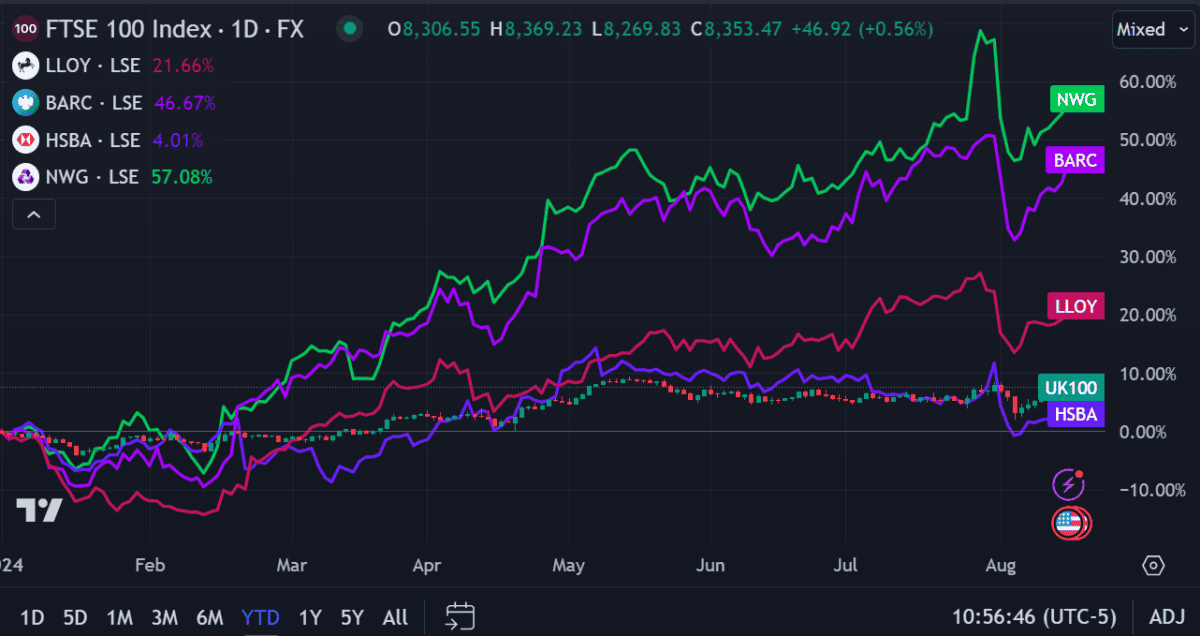Lloyds share price lags far behind Barclays! Which bank is better to buy?

Image source: Getty Images
I will not smear it – Barclays (LSE: BARC) performs better than Lloyds (LSE: LLOY) in terms of share price so far this year. And not just a little bit. Year-to-date (YTD), its growth is more than double that of the dark horse bank.
Still, at least Lloyds is doing better than FTSE 100which is more than I can say for at least one other bank.

Bank vs bank
As a customer, I have long been a fan of Barclays but I wouldn't say my faith is firm. There are times when the bank really tests my patience. I don't know much about Lloyds but it is an attractive stock nonetheless.
So if I wasn't invested in both, which would be the better choice today?
Let's compare their fees.
Lloyds
As the mortgage market becomes increasingly competitive, Lloyds is feeling the pressure. This is its biggest money spinner, so we need to be on top. And with the Bank of England (BoE) cutting interest rates last month, things are even tougher.
The cut means Lloyds' interest rates drop from 3.18% to 2.94% (the difference between what it pays in interest and what it actually pays). Basically, now it gets less and less from the loan.
Also, its results for the first half of 2024 were not good. Net income fell 9% and operating costs rose, resulting in a 14% drop in pre-tax profit.
But still, the bank's low price seems to offer good value. It has an attractive price-to-earnings (P/E) ratio of 8.9, trading 53% below fair value based on future cash flow estimates.
Finally, the core value proposition: an above-average dividend yield of 5.1%.
So how does Barclays measure up?
Barclays
Barclays' share price enjoyed a big boost from this week's news that the US could avoid recession. It rose 3.4% on Thursday while other banks closed around 1.5% higher.
That brings its annual return to a whopping 46%, which makes me wonder how much it can grow. Surprisingly, it still hasn't grown earnings, with a forward P/E ratio of just 6.3. This puts it well below both Lloyds and the UK bank's average of 7.3.
Several key announcements this month helped its fortunes. It increased its dividend by 7.4% and started a $750m share buyback. It also expects to complete its acquisition Tesco Bank in November this year.
My main concern with Barclay is that the current share price may be inflated. The past two years have been turbulent for the economy, with high interest rates distorting several metrics. Further rate cuts could tip the scales against it, potentially causing shareholders to reassess their positions.
Even after 16 years, the 2008 crisis is still fresh in the minds of many investors. Until the current recession is completely over, I remain wary of over-rating Barclays.
An important point
On the face of things, Barclays looks like its growth prospects are ahead of Lloyds. But those same metrics give me a moment to worry. It may promise better returns – but at what risk?
As a well-established market leader, Lloyds feels stable to me, if not very exciting.
So maybe a little bit of both is the best idea after all?
Source link



